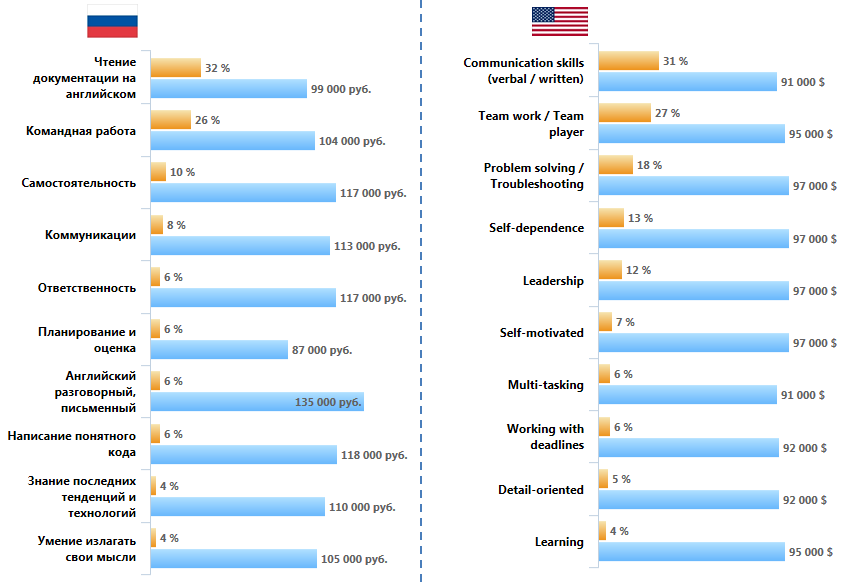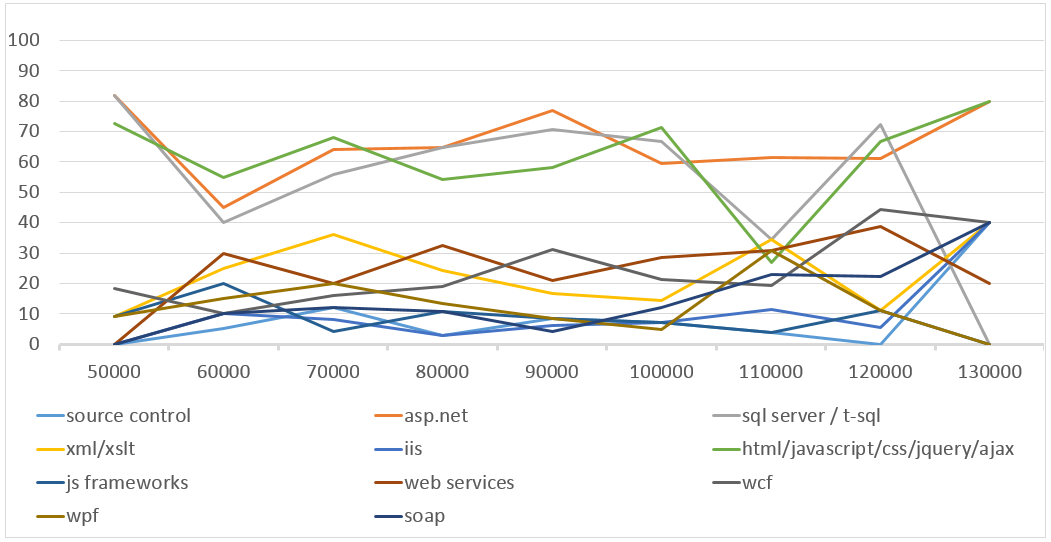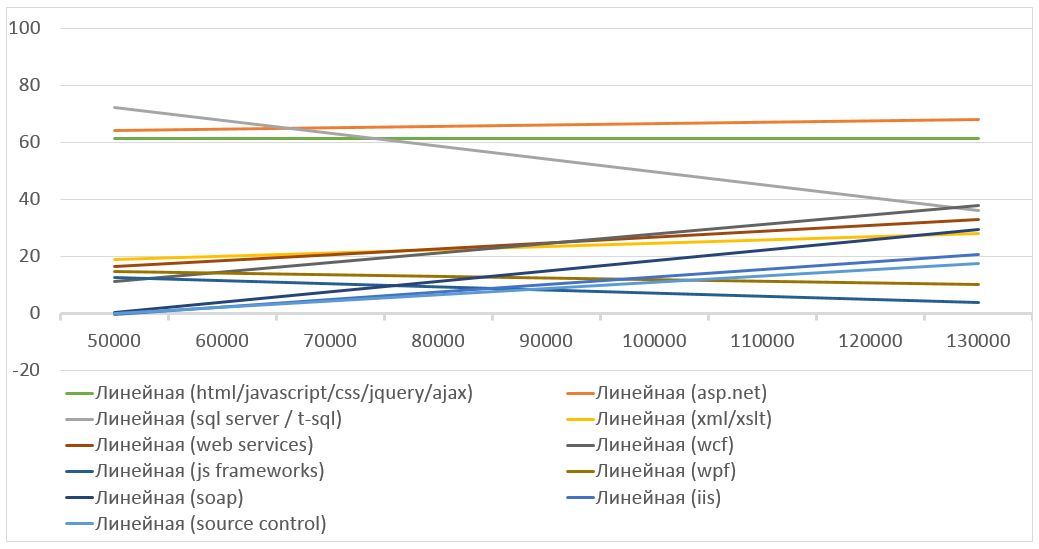Skills of .NET-developer of Russia and the USA, what's the difference?

The article “.NET-developer skills” was my first analytical study of the demand for skills in the labor market, in which I showed the needs of the Russian market close to us in the specialists of my profession. In this article, I present a comparison with a foreign market. They say that our IT market as a whole and the technologies we use in particular lag behind the West by several years. Let's look together "abroad" and try to understand whether this is so and whether we have something to learn.

Content
Preparation for analysis
The previous analysis required almost manually processing 300 vacancies, which turned out to be extremely time-consuming and too routine work. Therefore, now in my hands not only the results of a new study, but also improved tools! I implemented a utility with the help of which the text of vacancies is loaded from the target site, then it is broken down into separate words and phrases, and then, using a special dictionary, is converted into skills. I intend to develop the utility further, adding new adapters to various job sites, if necessary, and teaching the program, helping it to compare certain expressions in the vacancies to skills.
')
The new tool helped me to master this time more than 500 vacancies, of which in 430 cases we looked for specialized .NET developers, and 70 only indirectly related to .NET. Totally processed about 15,000 words and 550 different skills.
I took overseas jobs from popular resources Stack Overflow Careers and Monster.com .
If you want
Repetition

For the first time I spoke about the results of this study at the SkillsWiki conference ".NET-developer through the eyes of Russian and foreign employers" . Then I collected the first feedback on my calculations and conclusions. In particular, the audience was interested in the results of the study, but they wanted to get more different sections and conclusions on the above comparison between Russia and the United States. By the way, I was also asked about a similar study on managers, one of the topics of my future studies.
Well, I hope not to fail and satisfy your curiosity, let's begin!
Required Skills Rating
As before, the first thing is to get acquainted with the top 10 most popular skills in the labor market. For convenience of perception in the ranking, all skills are divided into 3 groups: technologies, professional (hard) and general competencies (soft skills).
Technology rating

As you can see, the differences in the popularity of technical skills are insignificant, which cannot be said about salary. In the left part of Russia, the salary is indicated in rubles per month, and in the right part of the United States - in dollars per year, that is, exactly as indicated in the job description. Do not rush to recalculate the income of the US ASP.NET developer on our rubles. I have already done it for you: it turns out about 380,000 rubles a month at the current exchange rate. But seriously, a direct comparison here is not very appropriate. First, various tax laws: for example, in the United States, payments may be a third of income. Secondly, for a full comparison it is necessary to take into account the standard of living as a whole, and this is a separate big topic. Therefore, I propose to compare salaries relative to each other only within one country.
Let's return to the rating of demand (popularity) of skills. And yet it may be noted a slight discrepancy:
- Experience with Windows Forms is not included in the top 10 US skills, since such a requirement is found in only 4% of vacancies. Statistics on the US market only confirms that this technology belongs to the category of dying.
- Knowledge of ASP.NET MVC is required only in 56% of vacancies. Considering this and the low popularity of Windows Forms, the question arises: maybe in the United States there is less need for Front-end developers as a whole - or do other technologies take this place? In total, ASP.NET, ASP.NET MVC and Windows Forms are found in 64% of vacancies, together with the mention of JavaScript or its frameworks already 76%, which is quite comparable with Russian vacancies, where participation in the Front-end development is required in 78% of cases. Building technology rankings for the remaining 24% shows that the most popular skills among them are knowledge of Transact-SQL and SQL Server, as well as testing. When selectively viewing offers, it is clear that these are vacancies of the leaders of development teams, infrastructure developers and back-end.
- In the US, the Entity Framework did not make it to the top 10, as it is found only in 8.5% of vacancies. Even with all the other data access technologies encountered, the percentage barely reaches 12.5%. Perhaps in US vacancies, employers for some reason do not consider it important to clarify specific ORM implementations. However, knowledge of SQL Server is required in more than half of the vacancies.
- We should also mention the JavaScript frameworks, which are gaining momentum and in the US have already hit the top 10, as they are found in every tenth job. The most common was angular.js (mentioned in 29 vacancies), followed by backbone.js, knockout.js and node.js with about the same popularity.
| Javascript framework | Popularity,% |
|---|---|
| angular.js | 6.7 |
| backbone.js | 3 |
| knockout.js | 2.3 |
| node.js | 2.3 |
| ember.js | 1.4 |
| ext.js | 0.7 |
| react.js | 0.7 |
| flux.js | 0.2 |
| marionette.js | 0.2 |
| require.js | 0.2 |
| underscore.js | 0.2 |
Skill rating

In the requirements for professional skills, the differences are much brighter.
First, the abundance of requirements for improving the quality of not only the program code, but also the final product: in particular, testing skills (not only automated, but manual), Unit-testing, TDD and Code Review, are immediately striking. All these skills are extremely rare in the requirements of employers to Russian developers. In the USA as a whole, development and testing are much more integrated, which can be seen not only by the example of this statistic, but also by large corporations. For example, this is the news of last year about large reductions of testers at Microsoft on the initiative of the new CEO Satya Nadella, who spoke about the responsibility for the quality of applications of the developers themselves.
Secondly, an appreciable role is played by the understanding of Agile-methodologies and the ability to work on these principles in teams. In the US, Agile has moved from the category of newfangled trends into a working tool.
I also got the impression that in the USA less attention is paid to the skills of reading someone else's code.
Overall competency rating

In the ranking of general skills, the differences are most significant. It is quite logical lack of demand for knowledge of English in the United States. However, there are substantial differences:
- Communication skills from the US developer occupy the main place, as they are required in almost every third vacancy, when we have only 8% of vacancies, and also be able to express clearly our thoughts in 4% of cases.
- Also from the American developers require such an important skill as "problem solving", in conjunction with "working with deadlines" and "detail-oriented". This allows you to understand that a developer should be able to act not only by technical methods, solve a business problem, orient to the user and his needs, and not just the code.
In general, the US market focuses not just on a technical specialist with skill, ability to design architecture, knowledge of various tools and approaches, the ability to design tests for the developed functionality and directly test it, but also a kind of consultant with technical expertise. In Russia, this is quite rare, as a rule, these are two different professions.
Interesting Facts
Some interesting conclusions can be made only by statistics, which is hidden under the peak of the iceberg of popular skills.
For example, I, as a person who released an application for Windows Phone, are interested in how popular is the development of various platforms for .NET developers? It turned out that here the Android platform is ahead of Windows Phone. Development experience, including under Android, was assumed in 11 vacancies against only 3 on Windows Phone!
| Mobile platform | Popularity,% |
|---|---|
| Android | 2.5 |
| Windows phone | 0.7 |
| iOS | 0.2 |
It also shows that cloud technologies are gradually developing. In total, Microsoft and Amazon technologies are required in 6.7% of vacancies (29 pieces). The demand for technology Amazon and Microsoft notes and Gartner: Microsoft - Gartner Magic Quadrants for IaaS, Application PaaS, and Cloud Storage .
| Cloud technology | Popularity,% |
|---|---|
| Windows Azure | 3.5 |
| Amazon Elastic Compute Cloud | 1.6 |
| Amazon Web Services | 1.6 |
The increase in vacancies associated with processing large data arrays (Big Data) is clearly observed. For example, it is noted that Data Scientist positions are present on the US market, whereas in Russia there are no positions at all (at the time of the previous analysis). It is noteworthy that the term Big Data in US vacancies is practically not used and was seen only in 1 vacancy.
Detailing the US market
Below are the most highly paid skill combinations. 3 combinations of common skills that make it possible to find vacancies with an average income of $ 130,000 per year were included in the rating.
| Skill combination | Description |
|---|---|
| Design patterns, Multithreading, OOP, Software architecture, SQL Server, WCF, XML / XSLT | Experience in building the architecture of the entire application, services and database. |
| ASP.NET, Design patterns, HTML / JavaScript / CSS / jQuery / AJAX, Oracle, SQL Server, WCF, XML / XSLT | Experience in developing an ASP.NET application, Front-end layout, ability to work with services and databases. |
| IIS, Oracle, PL / SQL, Source control, TFS, Visual Studio, WCF | Experience in developing and deploying web services, working with databases, writing PL / SQL procedures. |
In the ranking of the most popular skills in terms of the number of mentions in vacancies, the classic ASP.NET, HTML / JavaScript / CSS / jQuery / AJAX, SQL Server / Transact-SQL certainly takes the first place. It is found immediately in 130 vacancies (more than 30%). The remaining combinations of skills only complement it in different variations. For comparison, the most popular bundle with the use of WPF: WPF, Design, Design patterns, SQL Server / Transact-SQL - mentioned only in 9 vacancies (about 2%).
Below is a rating of skills on mathematical expectation, in other words, we will try to understand the ratio of the popularity of a skill and its payability.
| Skill | Mathematical expectation, $ |
|---|---|
| ASP.NET | 58,316 |
| SQL Server / Transact-SQL | 54 550 |
| HTML / JavaScript / CSS / jQuery / AJAX | 53,200 |
| Design | 29 135 |
| Design patterns | 28,713 |
| SQL | 27,753 |
| Web services | 24 198 |
| Team player | 23,105 |
| WCF | 22,626 |
| Testing | 22,594 |
| Communication skills | 21 523 |
| OOP | 20 379 |
| XML / XSLT | 19,740 |
| Agile | 19,719 |
| Visual studio | 18 512 |
| Software architecture | 17 995 |
| Documentation | 15 506 |
| Problem solving / Troubleshooting | 14,852 |
| Unit tests | 14,483 |
| SOAP | 12,415 |
| WPF | 11,656 |
This rating is not aimed at identifying the most paid or popular skills, but those that allow you to provide the best income on average in the market. It is necessary to focus on it primarily for those who are just entering the profession and want first of all to be in demand, and already for the second highest income.
For example, you can see from the first charts that the salaries of ASP.NET and WPF developer in the USA and Russia are about the same level, but the huge difference in their popularity makes ASP.NET a much more liquid investment in development than WPF.
When analyzing the results, a hypothesis emerged that many of the skills can be claimed only in a certain salary range and their demand gradually increases with salary growth or, on the contrary, increases. Let's try to build a graph of the popularity of skills for each payday offer. Hereinafter we will use technological skills, since for the remaining skills the statistics are much smaller and it is difficult to trace any correlations.

Such a schedule is difficult to analyze, since there are too few vacancies for certain salary offers, therefore we aggregate data by salary ranges to avoid failures, and at the same time we remove from the graph the display of the popularity of skills for maximum and minimum salaries.

Already much better, but you can see that many graphs are similar to the normal distribution, like the graph of the number of vacancies.

Therefore, it is worth taking one more step first: convert the number of vacancies to the percentage of vacancies in which the skill is found.

Since there are no strong bursts, unless there is a strong bias towards the use of WPF and XML / XSLT and a decrease in the share of SQL Server and HTML technologies in the 110,000 range, you should pay attention to the linear trend.

It is noticeable that there are skills for which requirements are stable in any price category - this is ASP.NET and HTML / JavaScript / CSS. There are skill groups that demand decreases as salary increases: SQL Server / Transact-SQL, JavaScript frameworks and WPF. And the skills that are gaining popularity: WCF, Web Services, SOAP, XML / XSLT, IIS and very little Source Control.
According to the graphs, it is noticeable that at certain points in time skills are gaining popularity or are losing it, so it is also worth finding the most popular skills in each of the ranges.
| $ 50,000-59,999 | 60 000-69 $ 999 | 70 000-79 $ 999 | |||
|---|---|---|---|---|---|
| SQL Server / Transact-SQL | 82 | SQL Server / Transact-SQL | 60 | HTML / JavaScript / CSS / jQuery / AJAX | 68 |
| ASP.NET | 82 | HTML / JavaScript / CSS / jQuery / AJAX | 55 | ASP.NET | 64 |
| HTML / JavaScript / CSS / jQuery / AJAX | 73 | ASP.NET | 45 | SQL Server / Transact-SQL | 56 |
| Visual studio | 45 | SQL Server / Transact-SQL | 40 | XML / XSLT | 36 |
| VB.NET | 36 | Web services | thirty | Web services | 20 |
| Adobe Photoshop | 27 | XML / XSLT | 25 | Visual studio | 20 |
| Php | 27 | Visual studio | 20 | WPF | 20 |
| Json | 27 | Javascript frameworks | 20 | VB.NET | sixteen |
| SQL Server Management Studio | 27 | subversion | 20 | WCF | sixteen |
| Adobe Creative Suite | 27 | VB.NET | 15 | Entity Framework | sixteen |
| 80 000-89 $ 999 | 90 000-99 $ 999 | 100 000-109 $ 999 | |||
| ASP.NET | 65 | ASP.NET | 77 | HTML / JavaScript / CSS / jQuery / AJAX | 71 |
| SQL Server / Transact-SQL | 65 | SQL Server / Transact-SQL | 71 | SQL Server / Transact-SQL | 67 |
| HTML / JavaScript / CSS / jQuery / AJAX | 54 | HTML / JavaScript / CSS / jQuery / AJAX | 58 | ASP.NET | 60 |
| Web services | 32 | WCF | 31 | Web services | 29 |
| XML / XSLT | 24 | Web services | 21 | Visual studio | 24 |
| WCF | nineteen | XML / XSLT | 17 | WCF | 21 |
| WPF | 14 | Entity Framework | 15 | XML / XSLT | 14 |
| SOA | 14 | Visual studio | 15 | mobile dev | 14 |
| Entity Framework | eleven | VB.NET | 13 | SOAP | 12 |
| SOAP | eleven | Tfs | 13 | Json | 12 |
| $ 110,000-119,999 | 120 000-129 $ 999 | $ 130,000-139,999 | |||
| ASP.NET | 62 | SQL Server / Transact-SQL | 72 | HTML / JavaScript / CSS / jQuery / AJAX | 80 |
| Visual studio | 38 | HTML / JavaScript / CSS / jQuery / AJAX | 67 | ASP.NET | 80 |
| SQL Server / Transact-SQL | 35 | ASP.NET | 61 | WCF | 40 |
| XML / XSLT | 35 | WCF | 44 | SOAP | 40 |
| Web services | 31 | Web services | 39 | Visual studio | 40 |
| WPF | 31 | SOAP | 22 | XML / XSLT | 40 |
| HTML / JavaScript / CSS / jQuery / AJAX | 27 | SOA | 22 | Tfs | 40 |
| LINQ | 27 | Sharepoint | 22 | IIS | 40 |
| SOAP | 23 | Orchard CMS | 17 | VB.NET | 40 |
| HTTP / TCP | 23 | Visual studio | eleven | ||
These data show the following interesting points:
- Unexpectedly, VB.NET, although not very popular, is consistently among the popular technological skills up to an income level of $ 100,000.
- WPF in some price ranges, generally up to $ 90,000 and in the range of $ 110-120,000, is popular, but does not have a weight in the overall rating and in the most massive $ 90,000-100,000 range.
- The share of skills in working with web services is growing along with wage increases. In particular, WCF is gaining popularity up to 44% in some ranges.
The rest of the list of the top 10 skills for all ranges of wages gave no surprises: the key places are held precisely by those skills that are in the general list of the top 10 skills.
Conclusion
This completes the review of the in-demand .NET developer skills in the US and Russia. Write comments and suggestions for future research, weighted criticism is also welcome.
The following review will examine the Java developer: the data have already been prepared, about 20,000 skills have been analyzed - so wait for the article!
Afterword
August 4, 2015
Colleagues, dear, I welcome everyone again!
Your comments here, as well as similar discussions on other resources, prompted me to write a small addition to the article.
As I saw, after reading the article, many concluded that it was a review from HR and therefore it was made very formally, without understanding the specifics of the profession and other things, but at the same time the study claims objectivity. I want to dispel these myths.
- Friends helped me to review: we all work in large well-known IT companies, each in .NET development for 8+ years directly, let's say, one by one in the code.
- We tried to maximize the quality of processing the only massively available source of information on the relevance of skills - vacancies. Many keywords were combined into a single skill, some altogether dropped, about 13,000 words were processed manually, not counting the processing of the resulting statistics. The ranking of skills presented in the article, in my opinion, is not a standard, but it gives an opportunity to draw attention to unexpected things or once again establish itself in the correctness of the assumptions.
And this is just one of the possible views on our skills. For example, you can look at the demand for skills from:
- Experts and companies. Here are examples of such skill reviews:
- Sijin Joseph tried to describe the developer skills matrix: sijinjoseph.com/programmer-competency-matrix;
- Opinion from Scott Hanselman in the form of interview questions: www.hanselman.com/blog/WhatGreatNETDevelopersOughtToKnowMoreNETInterviewQuestions.aspx;
- .NET developer development map for students: edu.cbsystematics.com/en/education/roadmap .
- States. Already heard about NARKov? No, this is not a joke, but the National Agency for the Development of Qualifications , on the portal of which you will find a professional standard for programmers. I advise you to look, it should be especially close for developers from state-owned companies.
- Jobs companies, which we took advantage of. On this topic, you will find only reviews with reviews of sections on programming languages, salaries, cities and countries, but not on individual skills of professions. Therefore, the article was born, it seems to me, eliminating the shortcomings of these "standard" reviews on programming languages.
- Opinion of the professional community and experts. Perhaps this is the most interesting, but so far still missing point of view. Alas, it can be found only in the form of individual and highly specialized polls.
If you have suggestions for improvement or an opinion on how to find out an alternative look at the skills of developers or other specialties, of course, write to us, we will try to take everything into account! For example, now we are actively looking for an experienced Java developer to get the most out of the next review - join us!
Source: https://habr.com/ru/post/263757/
All Articles